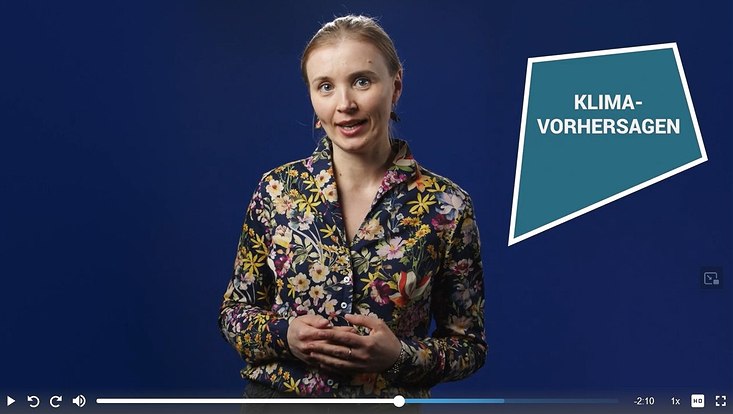Research communication fundingMaking Climate Information Easier to Understand—Yulia Polkova on her "Climate Competence Project"
23 January 2024

Photo: Polkova
In her project, "Klimakompetenz: Vom wissenschaftlichen Jargon zur Umgangssprache", climate scientist Yulia Polkova has initiated a series of videos that she is creating together with a research communication agency and the Deutscher Wetterdienst (DWD). The project was financed through the Hamburg Research Academy support fund for research communication.
How did you come up with the idea for this project?
When I introduce myself to someone outside my work as a climate researcher, people are interested and usually use the opportunity to talk about climate. Sometimes the questions are pretty advanced, but often, they are more fundamental, for example: what is climate and can we really predict the climate when we cannot even predict the weather in the next few weeks? Climate change has been in the media for a while and there are a lot of sources available to inform oneself about the topic but I keep getting the same questions. In my experience, people need to gain basic knowledge about the climate (as with Covid, when we all suddenly became virologists...)—above all, because climate terminology will become more and more relevant in the future. Thus, I want to make a contribution to strengthening climate competence in society at large. However, with regard to this, there is not only a gap between science communication and society, but also knowledge gap between researchers because we are all researching in our own special area. So other researchers don’t know, for example, that climate predictions exist (my research topic). This is also why I would like to make climate predictions more popular. I am keen to share useful information that is already available and can be used for certain areas such as agriculture, forestry, the health system, energy, insurance, etc.
What are the target groups for the videos, and why did you choose this medium?
Initially, Germany was the target audience. “Think globally, act locally” is a nice slogan, but currently there is a lack of local activity. All necessary information about the climate topic must be available in the respective native language. This is why we prepared our climte videos in German for Germany, even though German is not my native language—Ukrainian is. Short videos on social media also seemed logical to us. Originally, I wanted to share my knowledge, because I assumed that not many people understand what climate exactly is, that it is predictable to some extent, and that we can already use this information. If they knew, presumably they would act, right? Well, today I know this was a very naive impression. During the project, I found a lot of easily accessible resources such as climate courses, books, videos, and games. And the fact that we will experience climate change was communicated decades ago. I eventually realized came to conclusion that knowledge alone is not sufficient. For example, people know that smoking is harmful to their health, but many still smoke . So, people will not begin to care about climate just because they watched our videos.
I now see our target group more as those people who are on their way to understand climate information. This is why we joined forces with the Deutscher Wetterdienst—to provide their users with our explanatory videos. If, for example, you wish to buy a new smart phone, you already intend to buy one—you just don’t know which one, so you read, you look at a few reports, and then you make a decision. So, these and further videos (which you can find at the DWD and CEN, Universität Hamburg) will probably be used by experts or for educational purposes.

Copyright: mariquadrat
How did the funding help?
I deepened my knowledge about resources for popularizing science and strengthened my research communication network. I met my project partners from mariquadrat at a social event when I was looking for support to create my explanatory videos. I was excited about their work and they about mine. The chemistry was just right, so we decided to give it a try and applied for the HRA funding.
How do you want to use the video in the future?
In preparation for this project, I have reviewed what is available in terms of explanatory videos and found a lot of material, but mostly in English. My favorite source on YouTube is the Met Office—Learn About Weather, with very short and very informative videos using lovely, high-quality animation and carefully chosen words that quickly get to the point. However, I still don’t see such video material explaining fundamental weather and climate phenomena in German. Yet to be able to “act locally,” we need to be able to inform ourselves locally. Thus, I am convinced that the development of high-quality German-language resources is necessary to increase climate competence and awareness about which climate information is already out there and what can be achieved with the current climate knowledge. I would like to continue with the climate competence project and create more educational and inspirational material with a focus on local communities. In my free time, I also like to do volunteer work with Hamburg school children on these topics.
Research communication funding
You have a good idea but do not have the funds you need to implement it? The Hamburg Research Academy, in conjunction with the Claussen-Simon Foundation, provides funding to early career researchers for projects in the area of research communication. You can apply for funding for you own projects from the Hamburg Research Academy fund.



